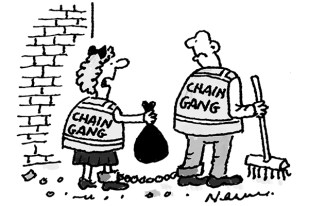Long before the official numbers began to rise, back in 2014, it was clear that knife crime was on the up. You could tell by the way small boys chased each other through the park with machetes, and by the zombie blades left in flower beds.
Now, seven years later, I feel the same way about what goes by the cosy-sounding name of ‘neighbourhood crime’. There’s the fashion for car theft (as poor Sam Leith found out), and the constant predatory circling of iPhone thieves on e-scooters. But worse than that, I think burglary is back, and I think it’s thanks to crack. We know drug use is creeping up: on Tuesday it was announced that drug-related deaths in England are at the highest level they’ve ever been. As for burglary stats, for those I rely on Nextdoor.
Every morning, instead of reading a newspaper, I open the Nextdoor app. It is a collection of conversations between people who live in the same area organised by subject (or thread), and it’s utterly absorbing. I had no idea so many people owned microchip readers just so as to reunite lost cats with their owners.

Whenever the rain stops, according to Nextdoor, the burglars appear. Come a balmy night, and inevitably the following morning Nextdoor will report that some poor person’s basement window has been levered open or their front door kicked in. The thieves take laptops, TVs, car keys… And because so many people now have Ring doorbell cameras, the perps are often photographed, caught as if in aspic, in a fish-eye lens. The police are called, shown the photos, but there’s never any word on the app of an arrest.
In mid-July, a Nextdoor user posted the pic of a man with a haunted rat face who’d broken into her apartment in Hackney. The following day, the same man was pictured stealing a bike and for the next few days there was a flood of stories and doorbell camera snaps of the same chap. He had broken into countless houses in Hackney and Dalston, it turned out, and had been doing so for years.
A woman recognised her own stolen backpack in a pic from another break-in. One man said he knew where rat face lived and another said he’d just seen him that day, smoking crack with his cronies. Shouldn’t we tell the police? asked someone else, who pointed out that the crack party was taking place next to a police station. Perhaps they could go and pick him up?
No chance, said another woman. She had tried once, after another burglary, to tell the police where he lived, but had been told that it was wrong to assume that rat face was a criminal. They had to catch him in the act, said the cops. I think they gave her a CAD (Computer Aided Dispatch) number, though. They hand out CAD numbers like sedatives.
As it happened, it was just a few days later that the PM announced what he called his new ‘beating crime plan’, and because of rat face and my worries about all the break-ins, I took notice. Neighbourhood crime is down 30 per cent year on year, said the press release. That was the first suspect stat. Yes, local crime has historically been falling, but that 30 per cent includes lockdown, which isn’t playing fair.
The police are called, shown the photos, but there’s never any word of an arrest
Much was made of the 9,000 new police recruits, but no mention of the fact we’re losing police almost as fast as we can recruit them. If you read Policing Insight magazine, as you should, you’ll know not just that drug deaths are up, but also that policing in the UK is witnessing what the mag calls ‘a steep and troubling’ rise in the number of officers resigning mid-service. Though the PM can truthfully say numbers are up, an alarming proportion of the bobbies on the beat are very new and very young. As of September last year, a quarter of all officers in England and Wales had less than five years’ experience, and one in ten were in the first year of their job. And you can tell. I peer at them through the armoured glass as they sit in anxious pairs in parked cars. I look at their hipster beards and I think: you’re no match for rat face.
It’s such a strange and unsustainable situation. On the one hand, there’s this young and demoralised force. On the other, there are the victims of violent crime, who thanks to new tech are able to film and track their attackers. They know what the burglars look like and where they live. One Nextdoor user suggested printing ‘Wanted’ posters in the manner of the Wild West.
And who’d be a copper now anyway? Who’d risk their lives chasing crack addicts when the rewards are so slim? When asked why they’re abandoning what for many was a vocation, older cops cite not just exhaustion but bad leadership.
That’s quite an understatement. The day after the new crime plan was published, it came to light that no one in government had consulted the cops before it was announced, not to check the policies, nor even to warn them an announcement was coming. I find this unbelievably depressing. It’s one thing to rush out a policy announcement just for the PR, to look tough on crime. It’s quite another to be so catastrophically bad at PR that you don’t even bother to clue in the police, who have now, of course, written a public letter to government condemning the plan. ‘We are no longer going to allow our members to be treated with such utter contempt,’ said the letter.
I think if I were a mid-career officer wondering whether to stay and defend people against neighbourhood crime, this whole affair would push me firmly into early retirement. It would be ironic, but not surprising, if the PM’s all-new plan in the end meant even fewer bobbies on the beat, just at the time we need them most.







Comments